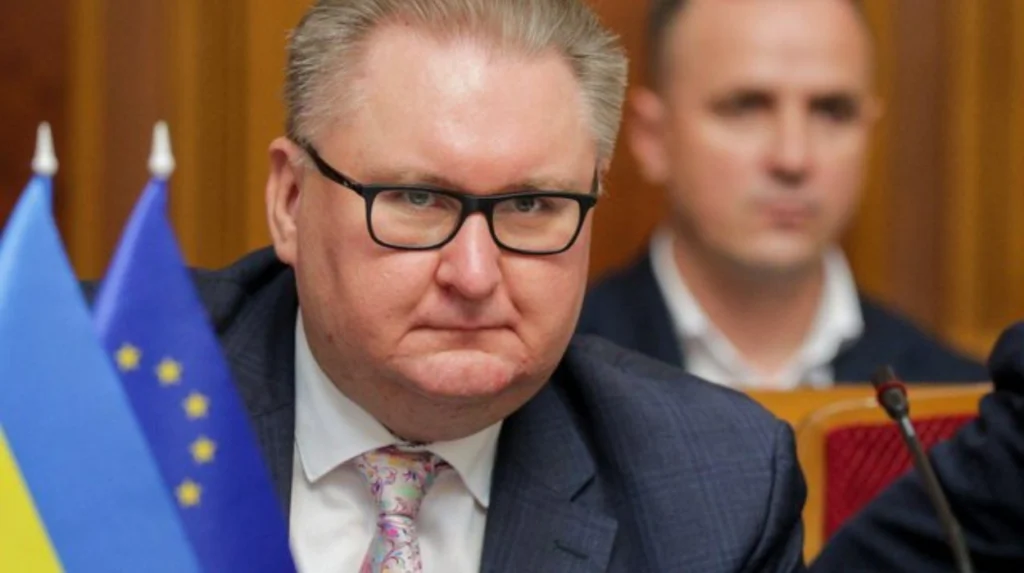The Organization for Economic Cooperation and Development (OECD) has extended a formal invitation to Ukraine to join the OECD Convention on Combating Bribery of Foreign Public Officials in International Business Transactions. This development marks an essential step forward in Ukraine’s ongoing efforts to enhance transparency, fight corruption, and align with global anti-bribery standards amid its broader reform agenda and geopolitical challenges.
Ukraine’s Deputy Foreign Minister, Yevhen Kachka, announced the invitation during a recent briefing, emphasizing its significance for Ukraine’s international standing and governance reforms. “The invitation demonstrates recognition of Ukraine’s commitment to tackling corruption and improving its business environment,” Kachka stated, highlighting the importance of adhering to international anti-corruption norms to attract investments and strengthen legal frameworks.
The OECD Convention, signed in 1997, is a landmark international agreement that targets bribery of foreign public officials by companies in international business transactions. It obliges signatory countries to criminalize such bribery and implement enforcement mechanisms to ensure accountability. The convention is widely regarded as a gold standard in global anti-corruption policy, with major economies participating and cooperating to reduce illicit bribery practices.
Ukraine’s path toward joining the convention has involved extensive reforms and cooperation with international partners. Since 2014, amid ongoing conflict and political transition, Kyiv has made significant strides in building anti-corruption institutions, passing legislation, and enhancing judicial independence. Joining the OECD’s anti-bribery framework now constitutes a binding commitment to uphold global standards in this critical area.
The Deputy Foreign Minister explained that accession to the convention will reinforce Ukraine’s efforts to curb corruption within the public sector and the private business community. He noted, “Formal membership will allow Ukraine to benefit from peer reviews and technical support, assisting in the strengthening of enforcement practices and regulatory oversight.” This will also increase transparency for Ukraine’s international economic partners, improving investor confidence and trade relations.
The invitation follows consultations between Ukrainian authorities and OECD officials, who assessed Ukraine’s compliance with convention requirements and its readiness for membership. The OECD’s annexation requirements include robust legislation criminalizing bribery, effective investigative and prosecutorial mechanisms, and international cooperation frameworks. Ukraine’s progress in these areas, despite ongoing challenges, convinced the OECD of its suitability to join.
The broader context for Ukraine’s anti-corruption reforms involves combating systemic corruption that has historically hampered economic growth and governance. Corruption has been a major concern in Ukraine’s judiciary, public procurement, and political financing. Through reforms, including the establishment of the National Anti-Corruption Bureau (NABU) and the Specialized Anti-Corruption Prosecutor’s Office (SAPO), along with judicial reforms, Kyiv aims to demonstrate a sustainable commitment to the rule of law.
Joining the OECD Convention will place Ukraine under regular peer evaluation processes, which assess the effectiveness of enforcement and legislative frameworks. This scrutiny is seen as a catalyst for continuous institutional improvements. Kachka acknowledged that challenges remain but expressed optimism about Ukraine’s trajectory, saying, “Our commitment is unwavering. We view this as an essential milestone toward integration with the Western economic and legal order.”
International observers note that the invitation is also a signal of Ukraine’s increasing acceptance by global governance institutions despite geopolitical tensions, particularly with Russia. The move highlights the international community’s support for Ukraine’s reforms and sovereignty. At the same time, it sends a message to business sectors worldwide that Ukraine is improving its investment climate by adhering to high ethical and legal standards.
Economic experts point out that accession to the OECD anti-bribery convention can play a crucial role in unlocking foreign direct investment (FDI), which is vital for Ukraine’s reconstruction and economic development. By reducing corruption risks, the country becomes a safer destination for multinational corporations concerned about legal compliance and reputational risks.
However, the ultimate effectiveness of Ukraine’s accession will depend on persistent enforcement and political will. Critics caution that lingering corruption culture and institutional weaknesses could undermine the benefits unless reforms are fully implemented and respected. The OECD’s peer review system aims to hold member states accountable by publicly assessing compliance and recommending improvements.
The Ukrainian government, aware of these challenges, has repeatedly pledged to maintain reform momentum. President Volodymyr Zelensky’s administration has prioritized anti-corruption legislation, judicial independence, and public sector transparency as pillars of its policy agenda. The invitation to join the OECD anti-bribery convention is seen as both recognition and encouragement for these ongoing efforts.
Beyond Ukraine, the OECD’s anti-bribery convention remains one of the few international treaties explicitly targeting foreign bribery by companies, offering an unprecedented level of legal cooperation across nations. Ukraine’s accession adds to the convention’s growing global reach, underscoring the increasing consensus on the need to combat corruption in international trade.
The next steps will involve formal ratification procedures in Ukraine’s parliament, followed by technical and legal adjustments to harmonize national laws with convention standards. Ukrainian officials have indicated readiness to expedite these domestic processes to formalize membership swiftly.
In conclusion, Ukraine’s invitation to join the OECD Convention on Combating Bribery of Foreign Public Officials marks a critical advance in its anti-corruption journey and international integration. It reflects both the country’s significant reforms and the international community’s confidence in Ukraine’s governance transformation. The challenge now lies in translating this milestone into real-world improvements, safeguarding legal integrity, and fostering a transparent environment beneficial to both domestic interests and global partners.







